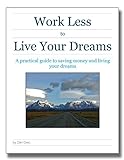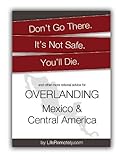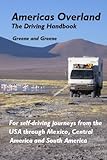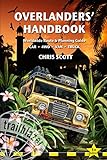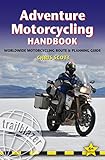Difference between revisions of "Bolivia"
(Edit from my earlier thingy (Wim Keesmaat)) |
(→Special Overland Travel interests) |
||
| Line 177: | Line 177: | ||
=Special Overland Travel interests= | =Special Overland Travel interests= | ||
* '''The Salar de Uyuni''' - The breathtaking Salt Flats are high on the list of every Overlander traveling across South America. Purchasing gas in Uyuni can be difficult depending on the time of year, day of week and who serves you. When supply is limited you will almost certainly be charged the "tourist" rate (double the normal price) and will not be allowed to fill containers. Plan accordingly. Enter the salt flats in Colchani, a short but extremely dusty and bumpy ride from Uyuni. When entering or exiting the salt flats it's important to drive on the most worn tracks to avoid sinking into the very soft salt/mud/muck. Following the black tire tracks on the actual salt is the easiest way to navigate. Many people have also put their GPS tracks online so you can be sure to go the right way. <ref>[http://www.peterkongsbak.dk/dl/up.gdb Garmin track log]</ref> After leaving the salt flats, be sure to thoroughly wash the underside of your vehicle to remove the salt. | * '''The Salar de Uyuni''' - The breathtaking Salt Flats are high on the list of every Overlander traveling across South America. Purchasing gas in Uyuni can be difficult depending on the time of year, day of week and who serves you. When supply is limited you will almost certainly be charged the "tourist" rate (double the normal price) and will not be allowed to fill containers. Plan accordingly. Enter the salt flats in Colchani, a short but extremely dusty and bumpy ride from Uyuni. When entering or exiting the salt flats it's important to drive on the most worn tracks to avoid sinking into the very soft salt/mud/muck. Following the black tire tracks on the actual salt is the easiest way to navigate. Many people have also put their GPS tracks online so you can be sure to go the right way. <ref>[http://www.peterkongsbak.dk/dl/up.gdb Garmin track log]</ref> After leaving the salt flats, be sure to thoroughly wash the underside of your vehicle to remove the salt. | ||
| − | Nicest part of the Salar de Uyuni is the northern part. Coming from Oruro, direction Uyuni, take the unpaved road north of the Salar to Salinas de Garcia (very cheap and nice hotel at the plaza. They have a | + | ** Nicest part of the Salar de Uyuni is the northern part. Coming from Oruro, direction Uyuni, take the unpaved road north of the Salar to Salinas de Garcia (very cheap and nice hotel at the plaza. They have a gas station, both diesel and gasoline). Then left or right around the Vulcano to Tahua, where you can get on the Salar. The salt here is very white, and there are a few nice little islands. Isla de Pescador, which you can see from the coast, is a very nice and quiet place to camp out. Huge cactusses and a great view in every direction. |
* '''South to Chile through the Altiplano''' - Overlanders looking for further adventure can continue South from the Salar, cross the Atcama desert and finally arrive in [[Chile]]. The total distance between gas stations is approximately 615km<ref>[http://theroadchoseme.com/the-uyuni-salt-flats-to-chile-2 The Uyuni Salt Flats to Chile Pt. 2]</ref>, and takes around 1 week. There a no official gas stations along they way, only occasionally people selling on the side of the road from a container. Food and water are equally as scarce, so you must be prepared. Temperatures swing wildly from hot, dry days to extremely cold nights, well below freezing. Navigation is very difficult as roads are almost non-existent and signs even less likely. [http://www.horizonsunlimited.com/hubb/south-and-central-america-mexico/san-pedro-de-atacama-uyuni-34664#post186853 This discussion on the Horizons Unlimited Bulletin Board] has a list of GPS way-points for the major places and required turns. This route is extremely remote and demanding on even a well-equipped 4x4 vehicle. | * '''South to Chile through the Altiplano''' - Overlanders looking for further adventure can continue South from the Salar, cross the Atcama desert and finally arrive in [[Chile]]. The total distance between gas stations is approximately 615km<ref>[http://theroadchoseme.com/the-uyuni-salt-flats-to-chile-2 The Uyuni Salt Flats to Chile Pt. 2]</ref>, and takes around 1 week. There a no official gas stations along they way, only occasionally people selling on the side of the road from a container. Food and water are equally as scarce, so you must be prepared. Temperatures swing wildly from hot, dry days to extremely cold nights, well below freezing. Navigation is very difficult as roads are almost non-existent and signs even less likely. [http://www.horizonsunlimited.com/hubb/south-and-central-america-mexico/san-pedro-de-atacama-uyuni-34664#post186853 This discussion on the Horizons Unlimited Bulletin Board] has a list of GPS way-points for the major places and required turns. This route is extremely remote and demanding on even a well-equipped 4x4 vehicle. | ||
When taking this route, note that customs is on a turn off (over a hill and out of sight) 80Km before the immigration border post, and the actual border with Chile. At GPS: | When taking this route, note that customs is on a turn off (over a hill and out of sight) 80Km before the immigration border post, and the actual border with Chile. At GPS: | ||
Revision as of 07:35, 17 December 2014
Pan American Highway > Bolivia
Currency to display:
Contents
- 1 Visiting Bolivia
- 2 Entering Bolivia with a Car or Motorbike
- 3 Driving in Bolivia
- 4 Gas and Diesel price in Bolivia
- 5 Safety and Security Considerations
- 6 Camping in Bolivia
- 7 Navigation
- 8 Special Overland Travel interests
- 9 Vehicle Maintenance
- 10 Buy or sell a car or motorbike in Bolivia
- 11 References
- 12 Helpful External links
Visiting Bolivia
Bolivia is a spectacular and harsh country to visit. Many Overlanders consider the Salt Flats and Atacama Desert a standout highlight of South America. Borders are simple and safety is not a big concern.
Entering Bolivia with a Car or Motorbike
Correct as of: June 2014
Required Paperwork
(To check if you need a travel Visa for Bolivia, application instructions and fees see: Bolivia Visa online application at VisaHQ.com)
- Passport of registered owner (original and one copy)
- Vehicle registration (original and one copy)
- Insurance (it appears some people are asked for this, most are not)
Process at border
- The owner of the vehicle gains entry at Immigration (Migración), usually with a tourist card, including a stamp in their Passport.
- The owner must show the new passport stamp and original vehicle registration to Customs (Aduana).
- The owner is issued a temporary import permit for the vehicle.
- The police might record the information from your new temporary import permit before you leave the border and stamp the other side of the permit. They might also ask you if you have all the required items in your car (including wheel chocks and insurance). If you say you don't, they will ask for a "voluntary contribution" = bribe. Say politely you don't understand, take the stamped permit and leave.
Cost of entry
Free for the vehicle.
USA Citizens $135.00 USD
Permitted length of stay
Usually the same as the owner, which is 30 days for most Nationalities.
Extension of stay
Unknown.
Describe the process to extend the permitted length of entry for the vehicle, if possible.
Storing a vehicle and temporarily leaving the country
You can store your vehicle and leave the country, so long as you return and exit the country before the temporary import permit expires.
Exiting with a vehicle
- The registered owner presents the temporary import paper to customs.
- The registered owner is stamped out of Bolivia at immigration.
Driving in Bolivia
Recommended books for Overlanding in Bolivia
Insurance requirements
Insurance is mandatory in Bolivia, however it's difficult to purchase because the vehicle will not be in the Bolivian computer system. Many people simply show the police SOAT insurance (Seguro Obligatorio Automóviles Transito) from another country (i.e. Ecuador or Colombia)
Cost of insurance
About $10.00 USD for a year (vehicle type: casa rodante).
Where to purchase insurance
Delta Brokers, small passage on Loaza street in La Paz, GPS: S16.499098 W68.1333 (about $10.00 USD for a year for a casa rodante)
UPDATE: Buying SOAT in La Paz, Bolivia (not available at the northern border, not sure about south). Delta Brokers, mentioned above, could not sell to us. Go to Seguros Illimani, Edificio Villanueva, Av. Camacho. It's a narrow, quite dark and unsigned, passageway that is right next door to Banco Bisa (left side of the bank entrance). Illimani is on second floor. It is half a block from the Seguros Illimani head office, the address of which is cited on other travellers' blogs as the place to buy SOAT, but you actually have to go to this sub-office. The head office is 10th floor, Edificio Mariscal de Ayacucho, Callé Loayza n: 233. GPS - S: 16,49881 W: 68,13324
July 2014: I was able to buy a policy at Delta Brokers, small passage on Loaza street in La Paz, GPS: S16.499098 W68.1333, address Edificio Mariscal de Ayacucho, Callé Loayza n: 233. The policy they sold me supposedly covers Bolivia, Paraguay, Peru, Brazil, Argentina and Chile and cost $130.00 USD for 12 months for a 4x4 camper. It is issued by Illimani which has offices in the same building. I went in to see them in the morning and had to return late afternoon. The policy does not seem to cover very much but hopefully will meet the minimum insurance requirements.
Driving license
Technically an International Driving Permit is required.
In reality, showing a license from anywhere in the world seems to be good enough.
Driving side of road
Right,
Right hand drive vehicles are permitted. Police or checkpoints that say otherwise are bribing you.
Mandatory items in vehicle
Two safety triangles, a first aid kit and fire extinguisher are mandatory and a very good idea.
If you do not have these items with you, the Police will have an extra excuse to bribe you.
Roads
General Road quality
Roads in Bolivia are typically very poor quality. Only a few major highways are paved, everything else is gravel that ranges is commonly rutted, full of pot holes and extremely dusty. Be prepared for some very, very difficult driving conditions.
Road signs
Road signs do exist, but are far from common. Most towns have at least one sign stating the name of the town and distances to the next towns.
Toll roads
All paved roads at tolled, you can expect to pay around $b15.00 BOB every 50 - 100km
Bribery in Bolivia
Police bribery is extremely common in Bolivia. The Police will try many different tactics to get money from you, often mentioning a "voluntary donation".
See the bribery tips page for advice.
Checkpoints
Police checkpoints are very common in Bolivia, where the Police are trying to stop the spread of stolen vehicles. Where a barrier blocks the road you will be asked to go inside and present your Passport, Vehicle registration, drivers license and the temporary import permit you were issued at the border. They may also ask if you have the Mandatory items with you. It is extremely common to encounter bribery at these checkpoints. They will ask for money in a variety of ways, usually in a friendly, non-threatening way. See the bribery tips page for advice.
Traveling with pets
Unknown.
List the entry requirements and anything else required to travel with a pet.
Gas and Diesel price in Bolivia
Last updated: July 2013
Foreigners are supposed to pay a "surcharge" to purchase gas and diesel, which is triple the listed price.
Some people have reported this is only enforced within 100km of a border, and you can certainly haggle and say "sin factura".
Others have been forced to pay the higher price regardless.
The prices listed here are the local price. Expect to pay three times more if you can not haggle the price down
Currency and unit to display:
| Gasoline Grade | Price |
|---|---|
| Regular | $b3.40 BOB per Liter |
| Diesel | $b3.70 BOB per Liter |
- Price Information: gasoline-germany.com - International Gas / Petrol / Diesel prices - Bolivia
Gas and Diesel Availability / Frequency
Line-ups to purchase gasoline and purchase limits are a very common occurrence in Bolivia. Purchase a full tank of gas at every opportunity.
Gas stations are frequent, except south of the Salar de Uyuni towards Chile.
Gas and Diesel Quality
Gasoline and Diesel are generally thought of as extremely poor quality. Gasoline is thought to have a very low octane rating, and diesel is likely high is sulfur.
Safety and Security Considerations
Driving at night
Driving at night is not recommended.
- Extremely poor road quality means potholes, washouts and other hazards are common.
- Dangerous driving such as tailgating, overtaking around blind corners and excessive speeding are common.
- There can be many objects on and around the road that are nearly impossible to see at night, such as livestock, people, slow moving carts, cars with no lights, etc.
Vehicle parking
Parking vehicles on the street in smaller towns during the day is typically OK. Find a secure parking lot in big cities and at night. Cost is around 5 Bolivianos per night.
Special driving considerations
The roads in Bolivia are notoriously bad, so be extra watchful for road hazards like potholes, washouts and bad roads in general.
Drugs and related problems are increasing around Santa Cruz, probably the most dangerous part of Bolivia. The roads to Brazil in the East are more dangerous than elsewhere in the country.
Security advisories and information
- Country Specific Information - U.S. Department of State
- Travel Reports and Warnings - Foreign Affairs and International Trade Canada
- Travel advice by country - Foreign and Commonwealth office (U.K.)
- Travel Advice for Bolivia - Australian Department of Foreign Affairs and Trade
Camping in Bolivia
Camping is not common or popular in Bolivia, though a few hostels in touristy areas have camping to cater for backpackers.
There is a new fully-equipped campsite in Jupapina near La Paz which offers a beautiful natural setting but within easy teach of the city. http://www.colibricamping.com
Prices for camping at hostels fluctuates with the tourist seasons - check a backpacker guide book.
Many Overland travelers roadside camp on the Salar de Uyuni and further South, and consider it safe enough. Note the overnight temperatures can be extremely low.
Camping guide books
No specific book exists, though the usual backpacker guide books mention when a hostel has camping facilities.
Drinking water
Tap water in Bolivia is not safe to drink. Every corner store sells 1 and 2 liter bottles, while 20 liter bottles are extremely difficult to find (possibly only available in La Paz).
Paper maps
Reise Know-How are amoung the best paper maps. Purchase paper maps before arriving in Bolivia
Maps of Bolivia are difficult to find, and road conditions change daily. Purchase maps before arriving in Bolivia.
GPS Maps of Bolivia
- Open Street Map: Appears to have good coverage.[1]
- Garmin: No map of Bolivia.[2]
- TomTom: No map of Bolivia. [3]
- Bolirut has pretty decent coverage [4]
- Proyecto Mapear has great coverage and version 10.0 also includes Argentina, Uruguay, Chile and Paraguay [5]
GPS co-ordinates for camping, propane, gas, repairs, etc. in Bolivia
- Campsite Listing - South America | PanAm Notes - List of campsites, with directions and GPS co-ordinates. Some at hotels (lists facilities and price), some roadside and free.
- Andes Expedition camping Locations - List of campsites, with basic directions and GPS co-ordinates. Mostly free sites.
- Camping Log 2: South America - List of campsites, shopping, fuel, propane and border crossings with excellent descriptions and GPS co-ordinates.
- Hackney Travel SA Waypoints - Raw GPS data (in gdb or gpx format) for waypoints (including campsites, fuel, repairs, propane and more)
- The Silk Road Motocaravan Network - Raw GPS data for waypoints (camping, gas, propane, points of interest and more)
Special Overland Travel interests
- The Salar de Uyuni - The breathtaking Salt Flats are high on the list of every Overlander traveling across South America. Purchasing gas in Uyuni can be difficult depending on the time of year, day of week and who serves you. When supply is limited you will almost certainly be charged the "tourist" rate (double the normal price) and will not be allowed to fill containers. Plan accordingly. Enter the salt flats in Colchani, a short but extremely dusty and bumpy ride from Uyuni. When entering or exiting the salt flats it's important to drive on the most worn tracks to avoid sinking into the very soft salt/mud/muck. Following the black tire tracks on the actual salt is the easiest way to navigate. Many people have also put their GPS tracks online so you can be sure to go the right way. [6] After leaving the salt flats, be sure to thoroughly wash the underside of your vehicle to remove the salt.
- Nicest part of the Salar de Uyuni is the northern part. Coming from Oruro, direction Uyuni, take the unpaved road north of the Salar to Salinas de Garcia (very cheap and nice hotel at the plaza. They have a gas station, both diesel and gasoline). Then left or right around the Vulcano to Tahua, where you can get on the Salar. The salt here is very white, and there are a few nice little islands. Isla de Pescador, which you can see from the coast, is a very nice and quiet place to camp out. Huge cactusses and a great view in every direction.
- South to Chile through the Altiplano - Overlanders looking for further adventure can continue South from the Salar, cross the Atcama desert and finally arrive in Chile. The total distance between gas stations is approximately 615km[7], and takes around 1 week. There a no official gas stations along they way, only occasionally people selling on the side of the road from a container. Food and water are equally as scarce, so you must be prepared. Temperatures swing wildly from hot, dry days to extremely cold nights, well below freezing. Navigation is very difficult as roads are almost non-existent and signs even less likely. This discussion on the Horizons Unlimited Bulletin Board has a list of GPS way-points for the major places and required turns. This route is extremely remote and demanding on even a well-equipped 4x4 vehicle.
When taking this route, note that customs is on a turn off (over a hill and out of sight) 80Km before the immigration border post, and the actual border with Chile. At GPS:
- Turn for Customs (Southbound) S22 24.958 W67 46.749
- Turn for Customs (Northbound) S22 25.488 W67 46.426
- Hito Cajon – Actual Customs Building S22 26.438 W67 48.346
Customers will keep the original vehicle permit and give you a stamped photo copy to take to Immigration. Many overlanders make this journey, you can read many trip reports such as Overland Guide to Bolivia’s Southwest Circuit | PanAm Notes, An Overlander’s Guide to Bolivia’s Southwest Circuit | fromalaskatobrazil, Bolivia's Southwest Circuit
- The Road Of Death - The infamous South Yungas Road gained the title of "World's Most Dangerous Road" and is a popular detour for mountain biking tourists and Overland travelers. Drive with extreme caution on this road where honking your horn around every corner is highly advised.
Vehicle Maintenance
Dealers
4x4s / Trucks
- Toyota Global Dealer Locator
- Land Rover International Dealer Locator
- Mercedes Benz International (select country on bottom right)
- Jeep International site locator
Motorbikes
Local Garages
- Iguana 4X4 - Bogota | Mechanic GPS: 4.714733, -74.055795 Perhaps the most overlander friendly mechanic you will find. Large shop which primarily focuses on 4x4 accessories, but have good all around mechanics. Offer free camping, usually including bathrooms, electricity and water. Great prices.
- Ernesto Hug at Volks Auto Shop in La Paz speaks English and is very friendly and helpful.
- Julio in Sucre is knowledgable and prices are very reasonable. This is a simple workshop, specialized in VW bugs and Kombis, but they do all kinds of vehicles, such as a Toyota Hiace 4x4. GPS: S19.04513 W65.24768. Shop is not marked, look for a larger gate between a copy shop and a dentist.
Buy or sell a car or motorbike in Bolivia
Buy
A foreigner can buy a Bolivian vehicle. If you plan on leaving Bolivia with the vehicle, make certain all the papers, including any insurance are in your name. This process is often so difficult most Bolivians simply leave the name of the previous owner on the paperwork - you will not be allowed leave the country without changing the ownership papers to your name.
Buy
Unknown.
Describe how a foreigner can sell a foreign-plated vehicle, or list not possible.'
References
- ↑ OpenStreetMap Bolivia
- ↑ Garmin coverage map
- ↑ TomTom Map availability
- ↑ Bolirut
- ↑ Proyecto Mapear
- ↑ Garmin track log
- ↑ The Uyuni Salt Flats to Chile Pt. 2
Helpful External links
- Bolivia: Visa and Passport requirements | World Travel Guide
- Health Information for Travelers to Bolivia - Center for Disease Control and Prevention
- Bolivia travel guides at wikivoyage
- Bolivia - Wikipedia, the free encyclopedia

